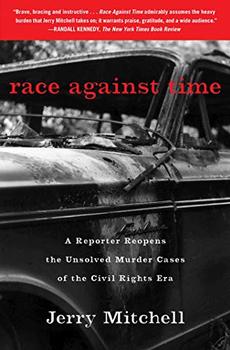Summary | Excerpt | Reviews | Beyond the Book | Readalikes | Genres & Themes | Author Bio
A Reporter Reopens the Unsolved Murder Cases of the Civil Rights Era

Critics' Opinion:
Readers' Opinion:
First Published:
Feb 2020, 432 pages
Paperback:
Feb 2021, 432 pages
 Book Reviewed by:
Book Reviewed by:
Jamie Chornoby
Buy This Book
Chapter 1
The Ford station wagon topped a hill before disappearing into the darkness. Mickey Schwerner drove, deep in thought. Fellow New Yorker Andy Goodman propped his body against the passenger door, drifting off to sleep. Mississippi native James Chaney, the lone African-American, swallowed hard, shifting in the backseat.
Two cars and a pickup truck raced to catch up. Schwerner spotted them in his rearview mirror. "Uh-oh."
The noise woke Goodman. "What is it? What do they want?"
Schwerner rolled down the window and stuck out his arm, motioning for the car to pass. "Is it a cop?"
Goodman gazed back. "I can't see."
The car crunched into the wagon, and Schwerner wondered aloud if their pursuers were playing a joke.
"They ain't playin'," Chaney said. "You better believe it."
Metal and glass smashed again. "What are we going to do?" Goodman asked.
Schwerner told his fellow civil rights workers to hold on. He jerked the wagon off the blacktop onto a dirt road, sending up a swirl of dust. His pursuers weren't shaken. Instead, they flipped on police lights and began to close the distance again.
Schwerner spotted the crimson glow in his rearview mirror and cursed. "It is a cop."
Goodman advised, "Better stop."
"Okay, sit tight, you guys. Don't say anything. Let me talk."
Schwerner turned to Chaney. "We'll be all right. Just relax."
The wagon squeaked to a stop. Doors opened and slammed shut, interrupting a chorus of frogs.
Flashlights bathed them in light. A Klansman with a crew cut told Schwerner, "Y'all think you can drive any speed you want around here?"
"You had us scared to death, man," Schwerner replied.
"Don't you call me 'man,' Jew-boy."
"No, sir, what should I call you?"
"Don't call me nothing, nigger-lovin' Jew-boy. You just listen."
"Yes, sir."
The crew cut moved closer to the driver and sniffed. "Hell, you're even startin' to smell like a nigger, Jew-boy."
Schwerner reassured Goodman, "We'll be all right."
"Sure you will, nigger lover."
"He seen your face," a fellow Klansman advised. "That ain't good. You don't want him seein' your face."
"Oh," the crew cut replied, "it don't make no difference no more."
He pressed his pistol against Schwerner's temple and pulled the trigger. Blood spattered against Goodman. "Oh, shit, we're into it now, boys," one Klansman said.
Three shots echoed in the night air.
"You only left me a nigger, but at least I shot me a nigger," another Klansman said with a chuckle, joining a choir of laughter.
Everything went dark. White letters spelled out on a black screen: "Mississippi, 1964."
I was one of several dozen people watching the film Mississippi Burning tonight, squeezed inside a theater where coarse blue fabric covered metal chairs. Nothing distinguished this movie house from thousands of other multiplexes across America. Except, of course, that this was not just any place.
This was Mississippi—a place where some of the nation's poorest people live on some of the world's richest soil, a place with the nation's highest illiteracy rate and some of the world's greatest writers. Decades earlier, Mississippi had bragged in tourist brochures about being "The Hospitality State." What it failed to mention was it led the nation in the lynchings of African-Americans between the Civil War and the civil rights movement.
Through newspaper photographs and television news, Americans had witnessed the brutality in Mississippi for themselves. In spring 1963, they saw police dogs attack civil rights workers in Greenwood. Months later, they observed the trail of blood left by NAACP leader Medgar Evers when he was assassinated in the driveway of his Jackson home. During the summer of 1964, Americans watched sailors tromp through swamps in search of the three missing civil rights workers, Chaney, Goodman, and Schwerner, who were last seen leaving the small town of Philadelphia, Mississippi.
Excerpted from Race Against Time by Jerry Mitchell. Copyright © 2020 by Jerry Mitchell. Excerpted by permission of Simon & Schuster. All rights reserved. No part of this excerpt may be reproduced or reprinted without permission in writing from the publisher.





The Flower Sisters
by Michelle Collins Anderson
From the new Fannie Flagg of the Ozarks, a richly-woven story of family, forgiveness, and reinvention.

The House on Biscayne Bay
by Chanel Cleeton
As death stalks a gothic mansion in Miami, the lives of two women intertwine as the past and present collide.

The Funeral Cryer by Wenyan Lu
Debut novelist Wenyan Lu brings us this witty yet profound story about one woman's midlife reawakening in contemporary rural China.
Your guide toexceptional books
BookBrowse seeks out and recommends the best in contemporary fiction and nonfiction—books that not only engage and entertain but also deepen our understanding of ourselves and the world around us.